How Grace Rowe Went From PR Intern to Producing New York Fashion Week
IMG Focus' senior director of production tells us how a fashion show comes to life.
In our long-running series "How I'm Making It," we talk to people making a living in the fashion and beauty industries about how they broke in and found success.
Production is, necessarily, a behind-the-scenes part of the fashion process. But without the teams that work tirelessly, for months, on every micro and macro decision that goes into a 10-minute runway show, they wouldn't happen. You just don't typically know their names.
Grace Rowe is one of those people. As IMG Focus' senior director of production, she oversees the teams that put on any number of New York Fashion Week events, from shows to panel discussions to presentations. That's not all they do, but, given its biannual nature (and all the small decisions that come together to bring the runway to life), fashion week does take up a big part of their plate.
"We do spend time throughout the year planning for each fashion production," she says. When we speak in late January, IMG Focus was deep into February planning, a process the company begins shortly after the September shows wrap. ("It's quite a short run between September to February.") Then, as soon as the fashion month train moves onto London, they'll start setting the stage, so to speak, for the Spring 2023 season: "September is the biggest season in New York. We're working around the clock into February, we have a short break and then it kicks off in September again."
Rowe got her first taste of fashion events while she was working at an agency in Australia. She got the chance to do some production for IMG, and was assigned to Fashion Week Australia. "It wasn't that I was necessarily interested in wanting to do it — I was drawn to the event experience that I already knew, that then snowballed into this passion," she says. Working that first season, "It really showed me that I could marry all of these big complex challenges that I find on other events with taking a new, unique, creative approach where this incredible energy is created."
Ahead, Rowe walks us through her career trajectory — from PR intern to senior director of production at IMG Focus, which brings many of New York Fashion Week's most memorable events to life — and discusses how the events industry has changed over the last few years and the ways it continues to open up and let more people in.
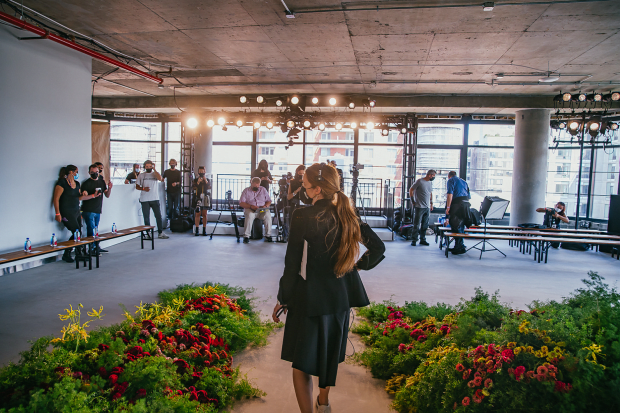
Photo: Courtesy of IMG Focus/Madi Atkins
Tell us about how you ended up in production: What interests led you there, and how did you get your break into this aspect of the industry?
When I finished high school in Sydney, Australia, I had the marks, but I didn't really know what I wanted to do or where I wanted to focus my attention. I thought I might like to be a journalist, and my journalist relative suggested maybe I think about public relations. So I landed myself a PR internship at an agency that did PR, events, advertising, creative and showroom, and I quickly realized I was pretty lucky to have landed this opportunity, because it really opened my eyes to this industry that I didn't know a huge amount about. I realized that there were all these great people around me — anyone who would look at me or listen to me, I just offered my help to. So, although I was the PR intern, the event director at the time would often loan me to go and work on his events, everything from skateboarding events to film festivals, fashion shows, award ceremonies. From probably the first week or two, I just knew I was hooked. I knew that that was exactly what I wanted to do.
I ended up working with that event director for eight years. He was just a great mentor that really encouraged me events and production.
What was it about events that spoke to you, more than the other departments at that agency?
It was really easy to delineate events from the rest because it was all about the energy involved — big, complex, detailed events that involved multiple players and moving parts, that was what really excited me.
I was working at a boutique agency, and I was also on secondment [editor's note: job rotation] at IMG as the production manager for Australian Fashion Week, and it was then that I realized I could combine all of these big, complex details and productions while leaning into this unique creative approach with this energy that's so hard to describe or replicate on other events.
How do you describe your job to someone who maybe doesn't know much about the fashion or how fashion week comes together?
It's hard to describe the role to people who haven't worked in events... When someone asks about what I do, I point to fashion week and I point to fashion shows, and a lot of people really understand what those are from social media. That's had a huge impact in people's ability to look behind a door that may have been closed. We design so many of our fashion shows so that people who aren't in the room can experience it.
In terms of production and events, we just say it covers every detail that you wouldn't necessarily think: It's everything from power, lights, security, cleaning — all of the things that make the cog turn, but everything fun and creative, too, so creating the beautiful set design, working with designers around their collection and how that shows up visually in the room through content. It really covers everything.
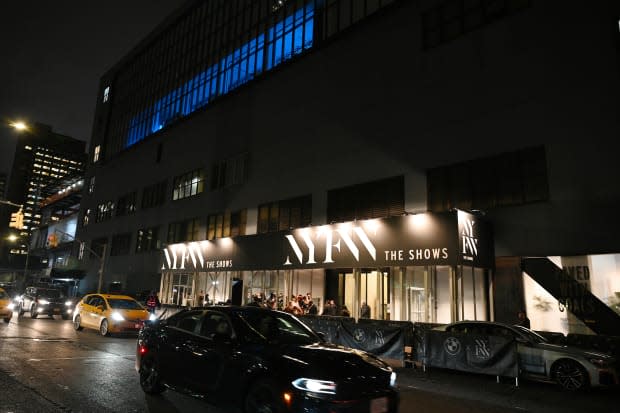
Photo: Bryan Bedder/Getty Images for IMG
What does a traditional career path in production looks like?
Starting as an intern and gaining experience anywhere you can is a pretty traditional approach. A lot of the junior staff that start with us, they start as an intern or assistant, and it's often through someone cold-calling or reaching out to us and really taking the time to make themselves known and show why they're passionate and why they want to work with you. It's something that we're trying to address, to try and open the door wider to people that may not know about this industry. I mean, I didn't know about a lot in this industry without having a foot in the door. So, we're working on programs at IMG to try and incorporate an opportunity for people, for students to know about event production and the opportunities that exist in fashion.
For people who aren't based in the four main fashion capitals that want to start a career in fashion, what are ways they can get their foot in the door?
I found that it's a great opportunity for people while they're at school or university to create an experience — an event, a fashion show — to really learn how to cut their teeth, make some mistakes, learn along the way, because it really is about trial and error when you're first starting out and learning. I would also be reaching out to events in their city, to understand what opportunities there are to take part in, because when you work on a live event or experience, there are a lot of skills and attributes that you'll learn and develop that can be applied to other styles of production.
Look people up on LinkedIn and social media, and understand who works in the industry and who has something to say in the industry. There are a lot of really great voices out there. Really learning the landscape and who the important players are is super important — following them on their social accounts, reading anything they're writing, looking at any content that they're posting — so, educating yourself on what's going on and also understanding what programs are being developed that you can take part in, because there are a lot of organizations who are creating virtual events or experiences that open up new doors.
We're working with Color of Change for New York Fashion Week this February [on a project] all about addressing representation in fashion. It's been a privilege to work on this, to help develop an inclusion rider, which is a hiring framework created to ensure that cast and crew of fashion productions are diverse and representative of the real world. It will debut at New York Fashion Week as part of the In the Blk show. It's just a really inspiring project to work on, and an incredibly talented team to work with. It's an honor to work with them. For anyone who wants to get into the fashion industry, it's definitely something to keep your eye on, because we're wanting to open more doors.
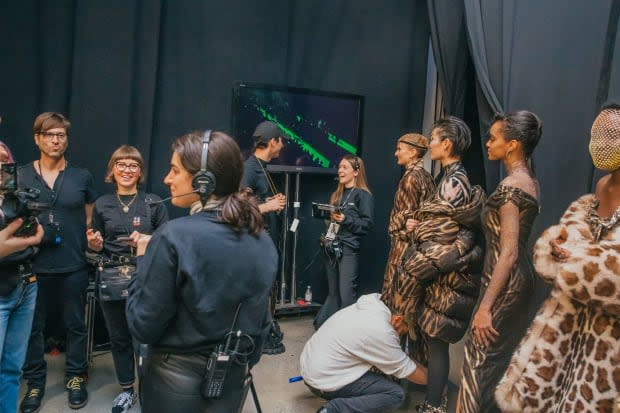
Photo: Courtesy of IMG Focus/Madi Atkins
What would you say are the most valuable skills you need for a career in production, at any stage?
The ability to adapt and innovate is incredibly important in events, because it's an ever-changing landscape where things will go wrong and things will change. It's a skill you need to develop. You can't just be reactive — you need to process and think about what the next steps are. Often, you need to have your backup plans in place before you start. But it's a skill to learn, having that approach to thinking, 'How do I adapt? How do I innovate? How do I make this better? How do I solve this problem with a very levelheaded and calm approach?' It comes naturally to some, but it's definitely something I think everyone can pay attention to and learn.
Being really patient and kind and knowing that there are so many people involved in an event who all have different objectives and they're all under pressure from different sources [is important, too] — ensuring that you know your objective isn't the only objective, and that there are other many people involved. It also helps to uplift the event. If you take that approach, it's only going to help you at the end of the day.
Knowing to value your relationships. The market that we work in here in New York — it's a huge city, but it's a tiny industry. So networking, investing in people, from your peers to your superiors to junior staff, is really important.
What would you say are the biggest challenges you face when working in production?
In the past few years, the challenges have evolved and intensified in different ways. The events industry has definitely been impacted — not being able to be in person, lack of travel, the whole digital evolution and so much content being out there. Continually trying to improve and evolve the experiential aspect is important. You have to keep on top of these things, keep researching how to ensure that those experiences are retaining people's attention.
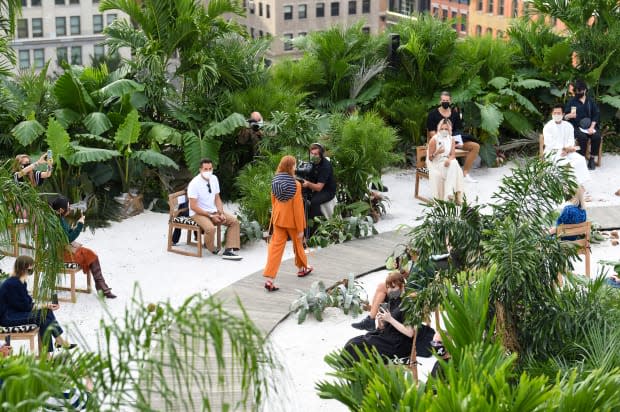
Photo: Jamie McCarthy/Getty Images
A specific challenge we faced in the last year was having to redevelop how we approach events in general. A skill we didn't anticipate to learn: working with my colleagues and the New York state government to stage New York Fashion Week during the pandemic, where we were developing an entirely new approach to health and safety in an ever-evolving landscape. We had to rethink our approach to everything to do with the production of an event and a show. And, fortunately, we had great success in that area — we staged New York Fashion Week three times during 2020 and 2021.
Covid has changed the capacity of a fashion show and how we plan for seating — that will stay very similar to how it is now, giving people space and much more room than they've had in the past. The same goes for backstage as well: Backstage is incredibly busy because everyone's working on a short timeline, but ensuring that there's more time and space allocated to people and that they feel comfortable. There are a lot of principles in the health and safety plans we've developed around New York Fashion Week that will stay for the long-term.
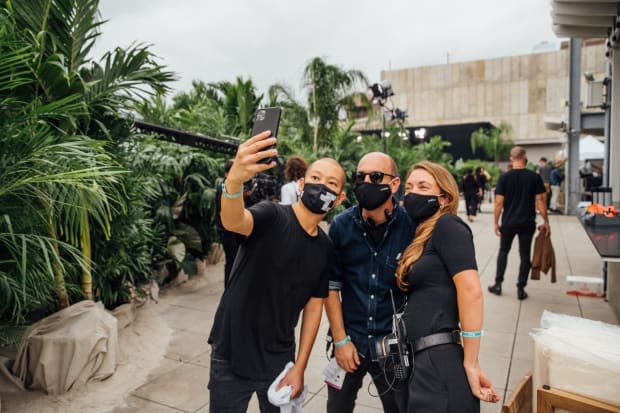
Photo: Courtesy of IMG Focus/Madi Atkins
One of my passions is sustainability in the fashion space. It's something I was heavily involved in in Australia, where we developed a three-year sustainability strategy for fashion week, and it's something that I'm passionately advocating for in New York. It's part of all of our pre-production processes, trying to identify and understand how we can improve our sustainability strategy in events and [lower] our footprint. It's about assessing what your existing approach is and working with professionals to improve and adapt that.
A big thing that we did in Australia was eliminating all plastic water bottles and bringing in reusable bottles to the event. It seems simple, but it's quite a task, and it's something that we hope to develop more strategies around New York Fashion Week for.
Anyone on my team knows that I'm not a paper person. Even the simplicity of fashion shows reducing the single-use items that are created, like show notes. Sometimes you can't avoid paper, but being conscious about how that item's chosen. Is it a renewable product? Is it something that will go on to be used something else? Is it something vital, that everyone needs? Are you accommodating to what you need and not in excess? The information and the content is incredibly important, and we have to be innovative of how we can communicate that information in new ways.
How does planning a fashion week event differ from planning a non-fashion week one for you?
There are a lot of similarities at the core of event production and project management. You're working with a client who has an objective; you're working out what's important to them, what they want to achieve and how they want to achieve it. You've got to identify what their creative vision is, where they want to hold it, what sort of audience they're targeting, what their budget is — and then, ensure that those creative points and objectives hit every aspect of the experience.
We don't just work on fashion week year-round. There are two a year, and we do spend time throughout the year planning for each fashion production... But in-between seasons — well, prior to Covid — we were doing many more in-person experiences; now, even more content production and virtual: working on awards ceremonies, designer programs that feed in and lead into fashion week, brand activations, launches. Anything that relates to fashion and events and experiential, we touch.
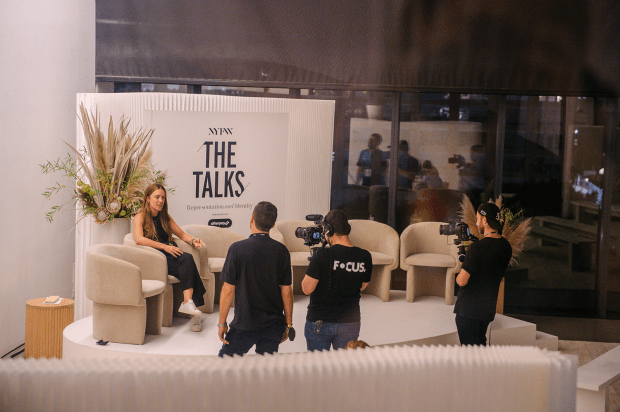
Photo: Courtesy of IMG Focus/Madi Atkins
You're now the senior director of production for IMG Focus, which is IMG's creative event production agency. You moved from Australia to New York to be a part of this team when it was founded in 2019, after already working for IMG in the Asia-Pacific region. How did your job change when you relocated?
I was responsible for Australian Fashion Week and was working in the Asia Pacific on our worldwide events, which evolved into coming to New York to support the global team here, producing events and shows. We saw a business opportunity: When I was in Australia, I would oversee the operations of fashion week, then the designers who would show on our schedule, in our venue, would have their own producers who would come into the event; in New York, we had a very similar system, but we were starting to produce our own events, that existed within our calendar, on our schedule. That evolved, in this natural progression, into IMG Focus. So I moved full-time to New York to start it.
Looking back on the scope of your career, from when you started in Australia to eventually moving to New York, what have been the most consequential events or projects you've worked on, the ones that stand out for you as building blocks to getting you to where you are now?
I'm very grateful to have worked with many world-renowned brands in my career. I would have to say starting out, one of the biggest was Facebook, when they opened an office in Australia, helping them produce their conferences and a hackathon, which then evolved into going to Asia and helping them produce conferences there. When they acquired Instagram, we also became their first experiential agency. In working with that team, you really are challenged to push the boundaries, challenge the status quo, really push yourself to do and be better... That was a huge learning experience for me that set some incredible groundwork for the events to come.
Even more recently, last September for New York Fashion Week, our team produced 17 shows. We started with Proenza Schouler at Little Island, which was such a memorable, beautiful moment; and we ended with Staud on the rooftop of Spring Studios.
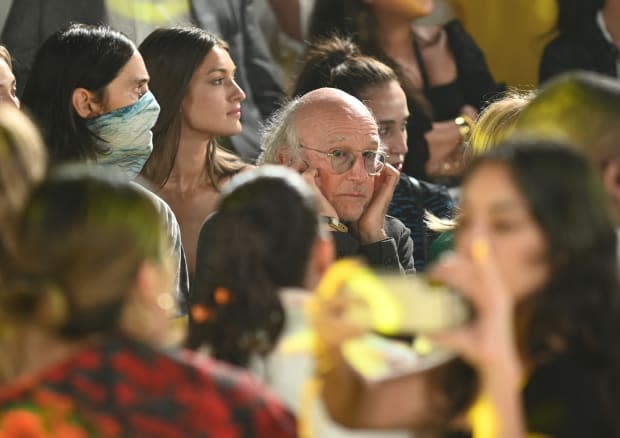
Photo: Jenny Anderson/Getty Images
Now, Staud was just such a fun show — you may have seen the Larry David memes... Even my younger brother down in Australia who isn't so fashion, saw that and loved that, as many did. But the strong creative vision of Staud, that show was great example of Endeavor and all the companies within it, from IMG Models to the Wall Group to WME, really putting their resources into a show. That's the sort of project that I really love working on, because you've got so many players involved and so many objectives, but as the producer, you need to ensure that the designer's vision and objective are woven through every aspect of that show.
Walk us through your responsibilities when it comes to making a New York Fashion Week fashion show happen.
The timeline differs with every designer. Some are really diligent on starting early, some really thrive under that late adrenaline. It's a unique experience, but they're all based around a few core principles: the creative vision, the collection, the location, the objectives and the budget. That throughline extends to a lot of other event production, but there are a lot of specifics around a fashion show that we need to think of.
Our process really starts around the creative. The creative is sometimes impacted by the budget, but we're always trying to determine what's important to the client and ensuring that what we put forward is what they want to achieve.
What does the actual week look like for you, in terms of the day-to-day?
I don't spend a huge amount of my time at Spring Studios [IMG's New York Fashion Week HQ] because we have shows all over New York City during New York Fashion Week. Again, in September, we had 17 shows and experiences that we were producing. This February, it's everyone from Altuzarra to Jason Wu to Proenza Schouler to Saks Fifth Avenue, and we have an amazing team who are working on each of these shows. My day-to-day will be working with our teams and overseeing each one to ensure that they're on track, feeling confident, delivering what we've developed with the clients.
They're pretty long days. Some days we have three, four shows; others, maybe one or two. So, every day is different, but every day is super charged with energy and fun. It's a huge amount of pre-production for a show that goes for maybe eight to 12 minutes, so it's super crucial to us to ensure that everyone has a positive and successful time as part of the event.
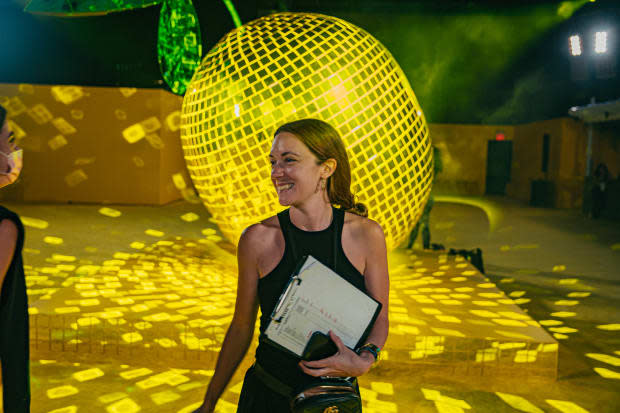
Photo: Courtesy of IMG Focus/Madi Atkins
What have been some of your personal favorite memories from New York Fashion Week?
I mean, there are so many. I love my job — you can probably tell. I love every thing about my job, despite the hours, the time, the stress. It's so rewarding, and it really is fun.
We were working with Christopher John Rogers on his second runway show, and his team is just so kind, so creative, so passionate. The pre-production and the lead up, we knew [it would be] something was special, but once we had built out this set for him, with the drapes and the chandelier... The sun was setting over the West Side, there was this beautiful light coming through, and you could feel the energy in the room that it was a special moment. This is before even a garment had walked on the runway.
We go backstage, and when you're calling the show or sending the models out, you're laser-focused on what you're doing — and when it's a really spectacular collection, you have this kind of double-take... When the dress that's on display at The Met came out and as the model walked onto the runway, you just heard the audience erupt. Fashion shows don't normally create a lot noise, people are just focusing. That's really an experience that I'll never forget.
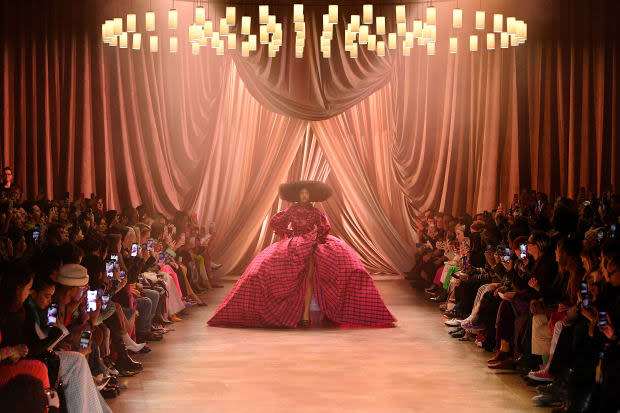
Photo: Dia Dipasupil/Getty Images for NYFW: The Shows
What's the coolest place that you have staged a fashion show?
One thing we do spend our entire year on at IMG Focus is venue research and building relationships with venues, whether they're a traditional venue or a unique space that's never held an event before.
In Australia, I did a fashion show under the Sydney Opera House — that was super memorable. It was threatening rain, of course,
for this outdoor event, and we were so lucky, the heavens didn't open over the show. In 2019, we did a show with Moulin Rouge when they opened on Broadway, a collaboration with The Blonds. Working with people in Broadway was a wonderful experience. They're so passionate and so fun and really willing to learn from each other. Little Island in New York had recently opened [last year], and Proenza Schouler was the first fashion show that was held there. That was certainly memorable.
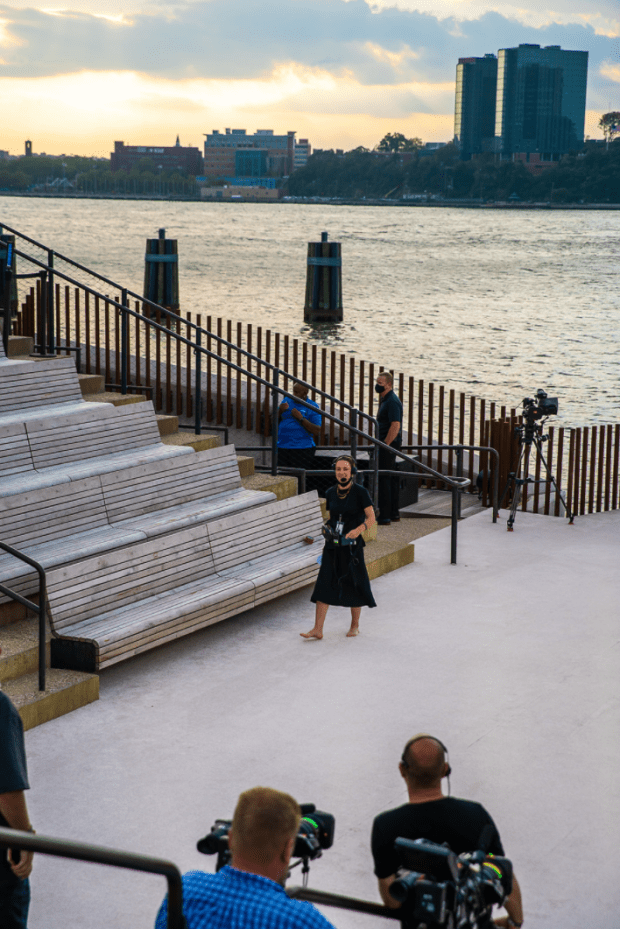
Photo: Courtesy of IMG Focus/Madi Atkins
Can you expand on how the pandemic has affected the logistics of your job, the macro and micro ways that not just your responsibilities have changed, but also the way you think about your work?
The way that we approach events and having to work remotely has had many highs and many lows. In many ways, we've become so much more efficient and adaptive, and have developed new ways of doing things, while also providing opportunities for people to be in the room that maybe there wasn't physically space for before. There have been some amazing doorways that have opened in event production, and there are so many talented, smart, creative people in our industry. It's important to think about event production and what we're putting out from many perspectives. Working remotely has really given us the opportunity to ensure that we're thinking about more perspectives, that we maybe haven't previously.
Downsides are: Events are so physical and in-person; a fashion show and the energy that you have in the room is very difficult to replicate in content. So, thinking about how we're creating content, filming content, editing content — is it live? Are we taking time to edit it in a different way? What audience is viewing this? What's the purpose of viewing it? Is it just for people to view it? Is there a shopping component? You're really thinking about not just the first and the second step, but the third and fourth, of how people are engaging with the event and what the impact will be.
What do you think makes for a successful virtual event or experience?
A really good communication plan around the event and what's part of the event so that people, when they show up, know what they can look for and be part of. When you're physically in an experience, you can wander in and meet people and find things — ensuring that people know what they're engaging in so that they do feel engaged as part of the experience, as opposed to just opening the Zoom, watching a video and closing it is super important. Also, having something that's interactive for people to engage and give their own thoughts... Giving people an opportunity to engage and have access and be able to navigate and see New York Fashion Week has developed an entirely new platform, that people can go and see whatever show they like. We're really supportive of ensuring that our designers can livestream for their shows.
What's exciting to you about fashion right now?
That people are wanting to put their best foot forward again. People want to wear interesting clothes that represent who they are. They want to show their personality. You can start to see that in a lot of the designs and the collections that are coming out.
This interview has been edited and condensed for clarity.
Never miss the latest fashion industry news. Sign up for the Fashionista daily newsletter.
